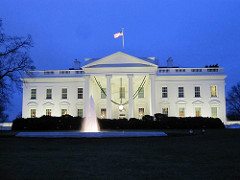The nation’s capital serves as a showcase for the United States on the whole, for better or for worse. The nation, like the city, is a collection of governmental organizations and places of historical interest, along with areas of shameful neglect and an impoverished population.
The homeless persons queuing up in McPherson Square in the hopes of receiving a meal and perhaps also some clothing come as a grim reminder while at the White House, located nearby, the President and his family live in luxury. What is not as immediately visible is the overall mood of cynicism and despair that these people in the square feel as they see wealth all around them, knowing that the wealth will always be unattainable to them and that people who pass them on the streets will regard them as a plague of sorts that needs to be expunged for the well-being of society.
Also invisible to the naked eye is the population of well-to-do people who feel paralyzed and embarrassed by the injustice they see before them but who see no way to can change the situation. They know that contributions of money, food, clothes and other consumer goods are little more than guilt payments on tax exemptions.
They know that such contributions are only token gestures that make the homeless more dependent. They know that until these unfortunate people learn how to get themselves out of their poverty and achieve self-sufficiency, the problem will remain.
Then there are some stalwart populists who argue that “these people are just lazy; they don’t even try to do anything for themselves.” These people know nothing about the needy except that they “bother” them by appearing in public places when they should be out of sight, out of mind so as not to annoy “decent people.”
However, the problems of the needy will not go away by themselves. Passing the homeless panhandlers on the street while ignoring them does not make them disappear; it only makes them more predatory and more desperate. Instead of helping to make the problem vanish, it makes it worse.
Rather than ignoring them or giving them token contributions, people need to help empower them. Incorporating the needy into plans that can empower them in their struggle to escape poverty and homelessness can be a win-win situation. Keeping the needy dependent on public assistance will never achieve positive results.
The person who conceives of a plan that transforms the needy into self-supporting individuals will surely be lauded in history as a truly great hero, because that person will save an entire nation.




